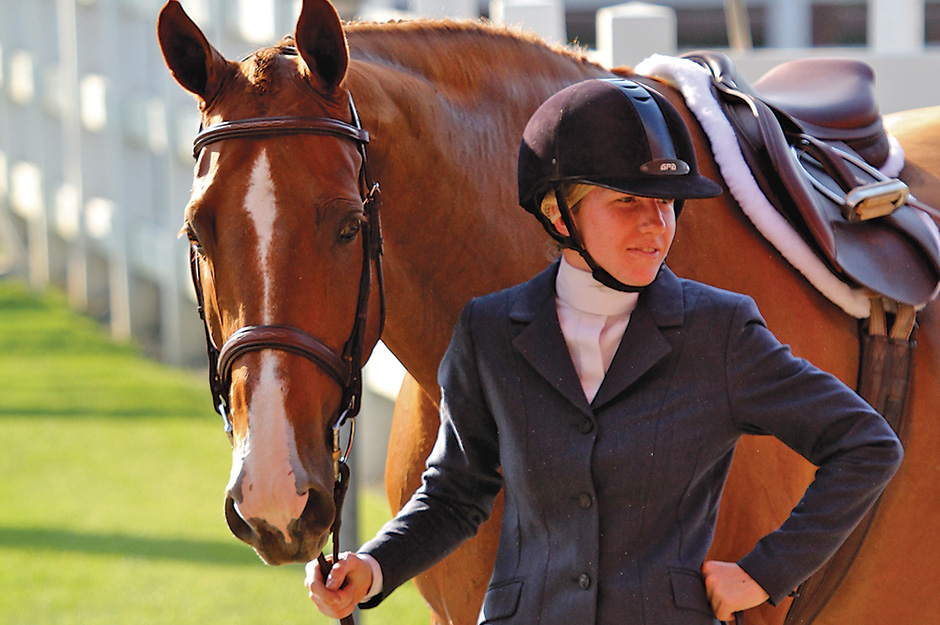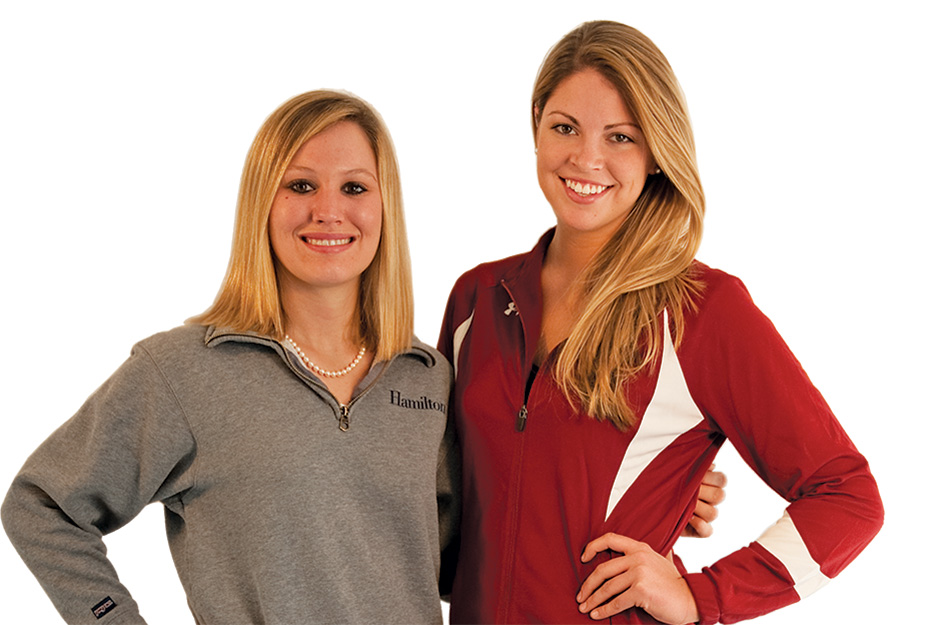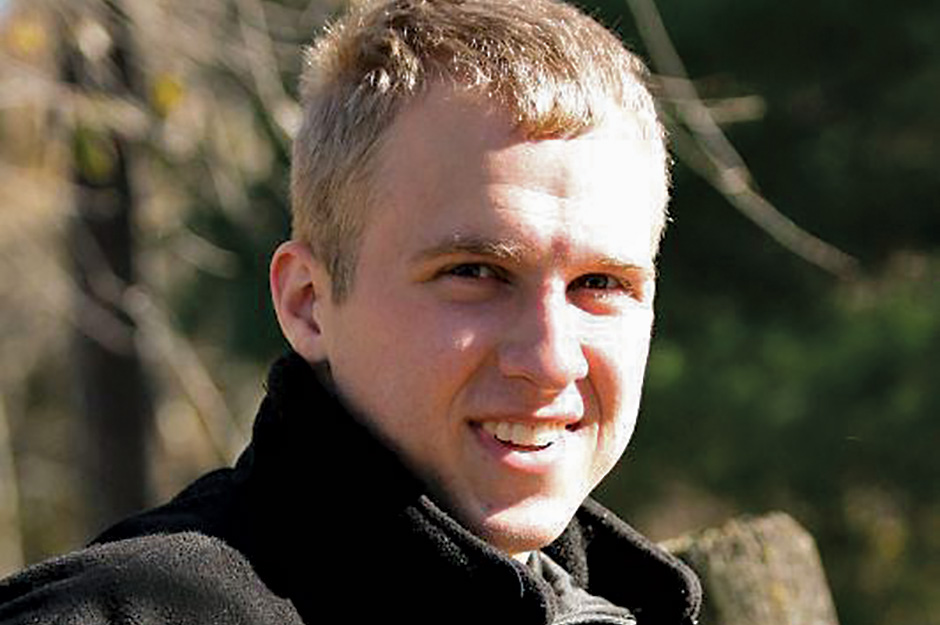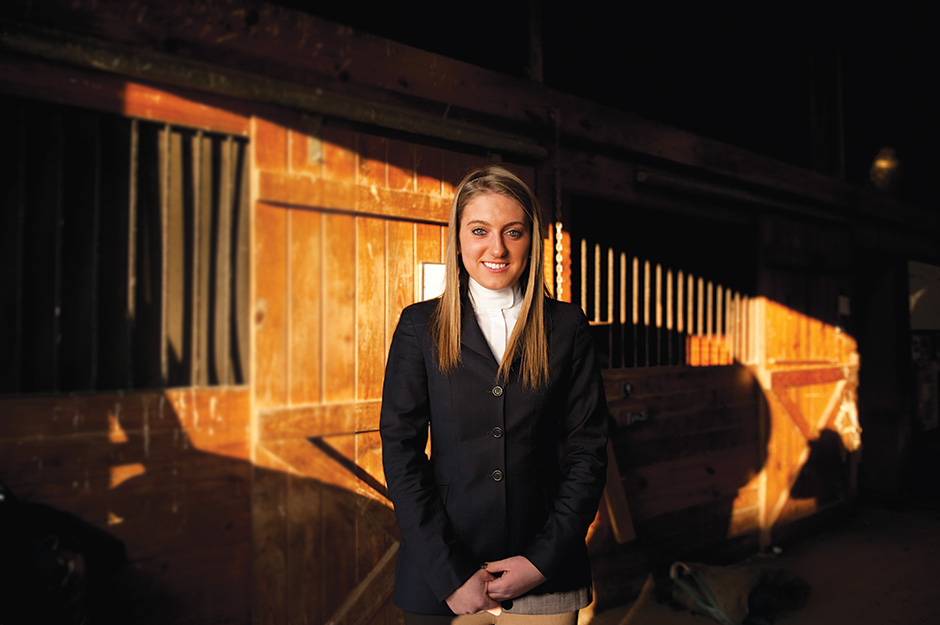Seven young riders from around the country tell EQ about their college choices, and what they found when they got to school.
(Published Spring 2013)
Jorden Davis (photo above)
IEA Team Captain
Will attend Oklahoma State University in the fall
I joined the IEA team at my barn, Seven J’s Farm. It has turned out to be a great experience, and I am very proud of winning my Open O/F class and coming in second in the Open Flat at Nationals last year. It worked out well for me to ride in the IEA because I have become used to “catch riding” from riding the sale horses at our barn, where I have learned to quickly alter my ride to suit the horse I am on.
I especially love the team aspect of the IEA. As captain of my team, I have become very close with every member. I love helping the younger girls by braiding their hair or putting on their number, and giving the more advanced girls a little advice before they walk into the ring.
While riding in IEA is much less expensive than showing on the A circuit, I do love both. I also really enjoy competing in the big equitation at regular shows where you and your horse have trained as a team. It can be hard if you don’t do well with the “luck of the draw” at IEA shows. It’s difficult to look as pretty on a green horse when compared to a well-seasoned equitation horse.
Sometimes it can be difficult to balance riding and high school. I usually go to the barn five days a week. Especially during indoors, I find it hard to get to bed before midnight. Usually I rush to the barn, ride as many horses as possible, then rush home to do homework, shower, and eat dinner.
I narrowed my choice of colleges to only NCAA Division One schools. D1s are the only schools that give equestrian scholarships and I knew I needed a scholarship to help pay for college. I sent a video to all of the D1 schools and got replies from most of them. I narrowed my choices down and went on recruitment visits. In the end, I fell in love with Oklahoma State, and will be attending the school in August! I am looking forward to riding on the team, meeting new friends, and preparing myself for my future. I’ll admit that I am a little nervous to be so far away from home — 26 hours! But luckily the OSU coaches are really friendly and I have a feeling they will help me feel at home.

Rachel Kolb
IHSA Rider
Stanford University and Rhodes Scholar
I knew that a priority for me in college was being able to continue riding, so I didn’t really consider any colleges without equestrian programs or where I couldn’t take my horse. I ride in the open fences and open flat divisions of the IHSA. I’m currently pursuing a master’s degree in English from Stanford, after graduating with my bachelor’s this past June. I’ll start out at Oxford University in the UK this fall studying post-1900 literature. My aspirations are to be a writer and public advocate for disability and accessibility. Horses are such an outlet and emotional release for me that they continued to be a high priority, even with the pressures of school. Even if making time for the team and for riding has been very difficult at times, the rewards have also been immense. I don’t think I could have been as successful or happy in other areas of my life without the horses, honestly. I also learned so much from coaches and teammates, which kept me feeling well-rounded and well-balanced–something that’s sometimes difficult in college.
Though I am deaf, I do lip-read and speak very well, so I primarily communicate with my teammates through one-on-one, face-to-face conversation. I’ve been fortunate enough to have a head coach, Vanessa Bartsch, who’s learned to sign a little bit, and who has always supported me communication-wise and made sure I know what’s going on. I also use sign language interpreters for team meetings and such, as needed. I use interpreters for all my classes at Stanford, too.
My experience on the team has been different from most people’s in learning how to be part of a group and how to contribute to that group. I feel like I come in at a disadvantage in terms of communication. Group interactions (which form the core of most team activities) are difficult and very frustrating for me — people chat back and forth, make jokes, change the subject, and talk on top of each other way more quickly than I can ever keep up with! Being involved on the team has taught me how to navigate that group-based territory more skillfully.
Riding itself presents its own challenges — not from the horses, who are always wonderful — but from getting coaching feedback from the ground when I can’t hear it! Working out a system of horse signs and incorporating that into lessons and the team culture has been enormous. Overall, I’ve learned how to be more tenacious, more confident in myself, and more knowledgeable about how to get the access I need.
One of the interesting questions I was asked in my Rhodes interview was to draw a connection between the art of riding and the art of writing. Riding a horse and writing well both require finesse, fluidity, and attention to detail. They’re also acts very centered in language, though riding, of course, is a physical language with its own unique challenges. I find mastering that language, and horses themselves, endlessly fascinating.

Abby Googel (photo above, left)
Hunt Seat IHSA Team Captain
Hamilton College
Growing up in Connecticut, I went to a small private school, so when it was time to look at colleges, I knew that I wanted to go to a small liberal arts college where I could feel at home. I knew that I wanted to be able to ride in college, but I was more concerned about finding the right school than finding the right equestrian team. As long as the school had riding in some shape or form, I knew that I could make the best of whatever the situation was.
My college search ended with Hamilton College in upstate New York. Arriving as a new freshman, I knew that riding on a regular basis would make school feel more like home, so I looked into the equestrian team as soon as possible. What I found was that Hamilton’s team was in disarray and numbers were dwindling. By the end of my freshman year, I had become co-captain, and I had a plan. I had big dreams for our little team, and I wasn’t going to sit around and wait for them to come true.
I rallied as many members as I could and did some research on barns in the area. To my surprise, there was a world-class equestrian facility practically in Hamilton’s backyard. After talking to Jean Raposa, who co-owns White Fox Farm with her son David, she agreed to coach us and I decided to move the Hamilton team and begin fresh.
By the following year, the team had more riders than ever, and with each show that we attended, our ribbons got better and better. Riding on the team was a great way to make friends, further my career as a rider, and so much more — I even had the chance to bring my horse to college. But the most rewarding experience for me was taking on the leadership of the team. Although I faced many challenges along the way, both administrative and budgetary, I learned many invaluable lessons through the process of running and managing an organization. Now that I have graduated, it is so gratifying to be able to step back and see how far the program has come. It was not always easy, but it was well worth it!
Maggie Fortune (photo above, right)
Western NCEA Rider and Team Co-Captain
University of South Carolina
I’ve competed Western since I was about 7, but I had never planned to ride for a varsity team in college. I always thought that I would go to a small liberal arts school in New England, but when I began getting recruited, it was like a new door opened, and I was pleasantly surprised by all that was on the other side.
Right before my senior year of high school, Ruth Sorrel, the associate head coach at the University of South Carolina, called me a couple of times and I decided I should go for a visit. At this point, I saw the trip as more of a vacation than anything else — it was the middle of January, and I was going to escape the snow and gloom of the Northeast. But I loved USC! What had been a back-of-the-mind, never-really-going-to-happen option became something I was seriously considering. Before I knew it, I was signing my name to a contract with the University of South Carolina — and I am so glad I did.
There are unbelievable academic, social, and financial perks to riding for a Division I school. I have never been a part of something so cohesive, so supportive, and so fun. The degree to which these young women commit themselves to each other and to the team is amazing. Since NCEA teams contain both Western and English riders, freshman year was like a crash course in all things equestrian! My new teammates and I sat around exchanging stories for hours, just exploring the differences between riding styles in the AQHA and USEF. We had so many questions and stories. But by sophomore year we understood both and were even critiquing one another.
One thing that most English riders don’t know about Western riding is that youth/amateur riders can only show horses that they own. So, when I went to school I had only competed with a total of 4 horses over about 10 years. Suddenly, I was expected to ride dozens of horses, with only four minutes of preparation, and I was expected to win. For me, this was a complete shock. This was definitely an easier transition for the English girls, who had been able to ride multiple horses all of their lives, thanks to USEF rules. Thankfully, my coaches and teammates were incredibly supportive. I am definitely a much more versatile rider now, thanks to college. I think we can all say that about ourselves.

Cadet Lance Barrow (photo above)
IHSA Rider
U.S. Military Academy at West Point
I chose to attend West Point because I want to become an officer in the U.S. Army. Leadership is a passion for me and West Point is a school that values and teaches leadership. Growing up, I had no experience with competitive riding, but my family had always had horses, and I enjoyed them. I was encouraged to try out for the team by someone who was already on the team, one of my leaders during Cadet basic training when I first arrived.
I started in walk-trot last year, which is the lowest level you can ride at in the IHSA. I have since progressed to ride in walk-trot-canter. It is a nice feature of the program that you are able to progress based on your performance. Because I started out with only a basic riding foundation, almost everything that I have been asked to do on the team has been a learning experience for me, especially Western equitation. But then, this sometimes makes things easier, because I don’t have any old habits from other disciplines to overcome.
I believe the West Point team is very different from other teams in the IHSA because our additional military responsibilities and duties often make finding time to ride on the team more difficult than at other colleges. Our practice schedules and routines are often interrupted by mandatory military activities. At times it is difficult to balance the team activities with our other academic commitments, but it’s definitely worthwhile. Although we take our riding seriously, that doesn’t mean it isn’t fun and relaxing. We enjoy every opportunity that we get to ride. It’s nice to get a change of scenery.

Kristen Russomanno
Polo
Cornell University
I was a 17-year-old freshman, and I brought my equitation horse with me to Cornell, and continued training for the equitation finals. I ended up spending time around our barns, helping the equestrian team at their home shows. That was where I saw my first polo practice, and I knew that I had to learn how to play!
The program at Cornell introduces interested riders through a first-year team. To make it through try-outs you need to be able to canter down the ring, show two figure-eights with lead changes, hand gallop back to the center of the ring, and halt — on one of the string ponies. Assuming you can master this test, you can learn to play polo with the best team in the country!
I joined the freshman team my sophomore year, and by my senior year I was playing with the starting string in many of the games.
The freshman players cleaned and oiled a set of tack each week, and upperclassmen took responsibility for a pony. This meant grooming each week, body clipping in the winter, roaching manes for matches, cleaning blankets, and any other care the pony might need.
Joining the team was like being adopted into a family. You spend hours together at the barn and you go through a lot together. The men’s and women’s varsity teams practice in separate chukkers at the same practices, so both teams are very close. It’s a great support system. The men come to every women’s game and vice versa. Many of the away games are held jointly as well, so everyone travels together.
On the first night of practice, the first-year coach told us to look around, because many Cornellian polo players end up meeting their spouses on the team! Although that may not have happened for me, I definitely met some people that will be life-long friends!

Schaefer Raposa (photo above)
NCEA finals
Southern Methodist University
I was born into the horse world — I have lived on a farm my entire life, and both of my parents are equestrian professionals. Every winter, my family and I head south to Wellington, Florida, to compete at the Winter Equestrian Festival. Because of my parents’ business, I have traveled to many competitions and I have ridden many different horses. Looking at colleges, I knew riding on a team would be much different from what I was used to, and I was excited about the team aspect…I have never been part of a team before, and it is so cool having your teammates cheer you on after each round. I feel a different kind of pressure when I go into the ring, because I know that if I make a mistake I am letting more than myself down.
I visited several universities with NCEA equestrian teams, but after looking at Southern Methodist University, I couldn’t get it out of my mind. I loved the campus and the location of the school, and after meeting with the coaches I had a good feeling about the equestrian team too. The coaches were not only concerned with my experience on the team, but also my experience as a normal college student. The Mustangs have a small team compared with many NCEA equestrian universities, but I think a small team has an advantage because the coaches are able to focus on each of us as individuals.
We are a very competitive team, but not against one another, which is nice. The team was an instant group of people to hang out with, and the older girls on the team introduced me to more people at school. But it wasn’t all easy. I remember at my first day at practice, I didn’t know where anything was and I didn’t know any of the horses. I thought to myself, “Wow this is going to be a long semester.” But after just a few days it became routine and the semester flew by!

